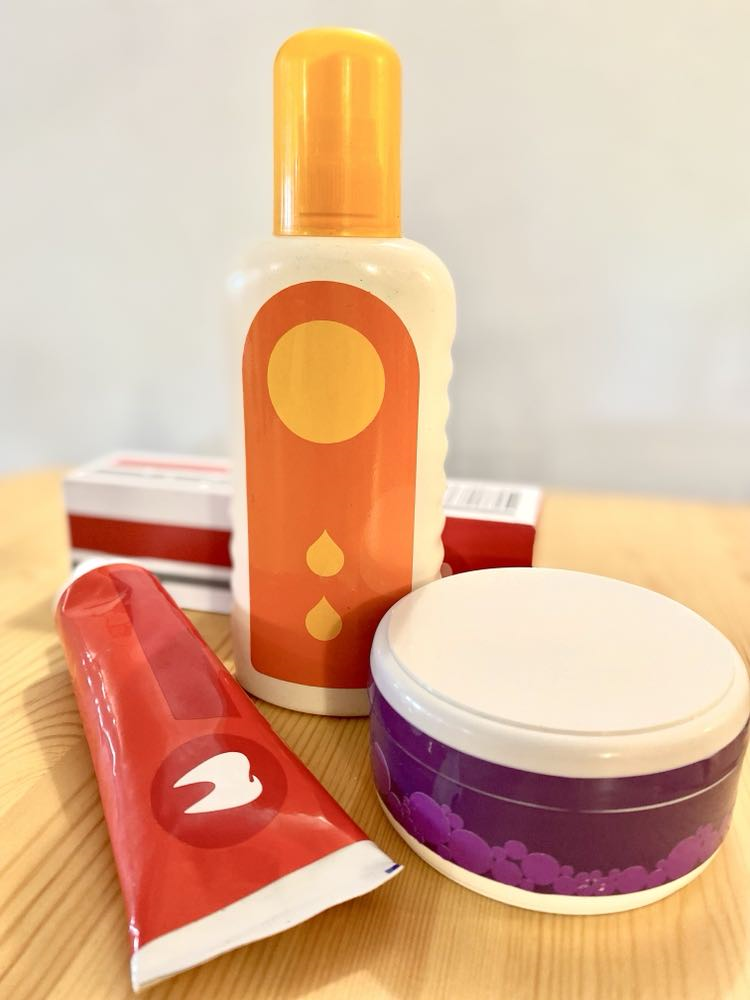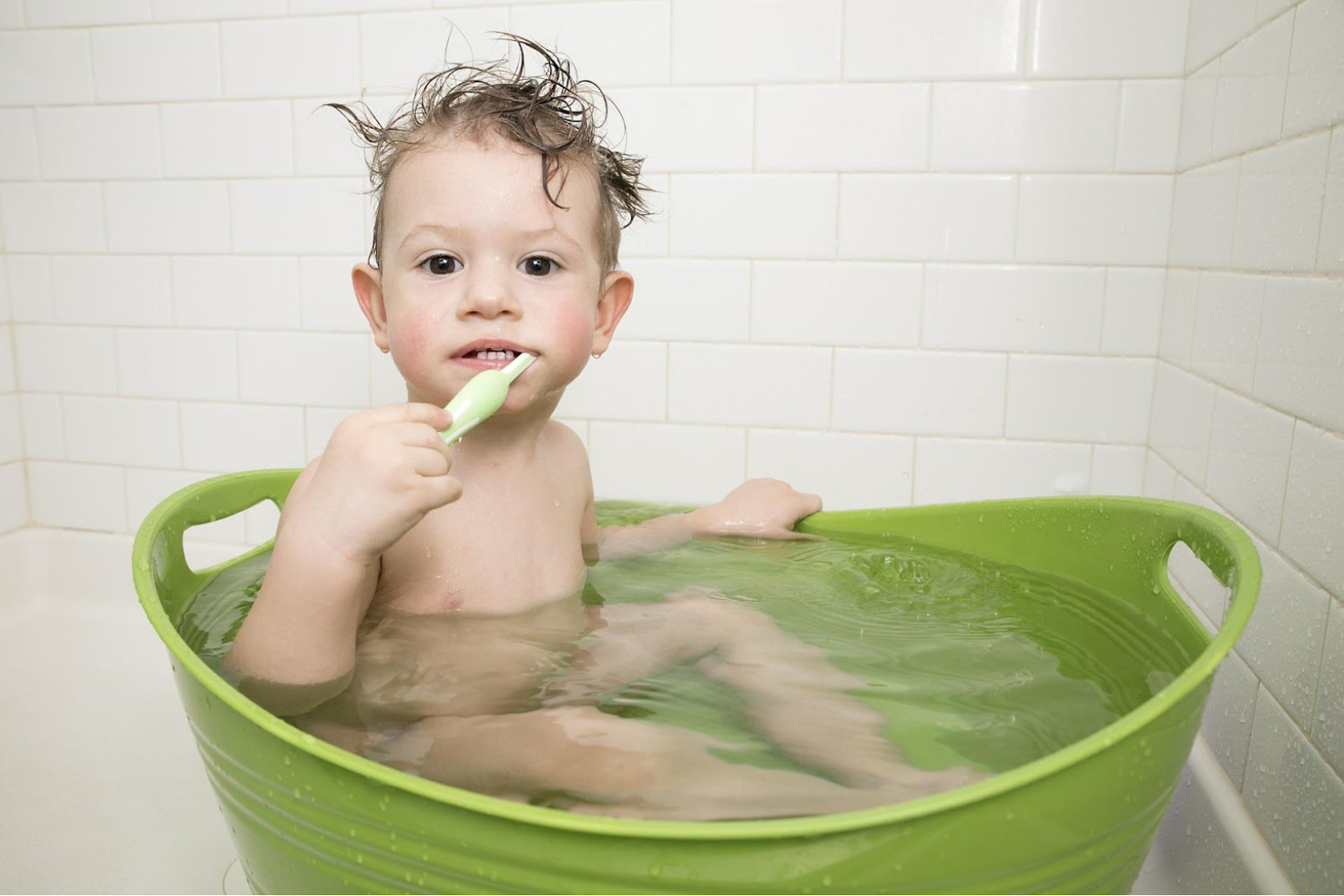How crazy it is to see that now even for babies, we are targeted with advertisements and pushed to believe that babies “need” a daily skin routine just like we do. As you already might know from our previous articles, less is more when it comes to cosmetics and in the case of babies this is especially important. I will show you why.
Unfortunately, not all cosmetic manufacturers care about the user and even in children skin care products we can find some pretty nasty stuff.

For example, we have looked at this baby shampoo from Johnson’s, and even though it is meant for babies – the most vulnerable group – it contains such terrible ingredients as BHT. BHT is a potential endocrine disruptor and is highly toxic to aquatic life as we wrote in the article about BHA and BHT.
This is just one example, but the more you study different ingredients that make their way into our cosmetics, you will be horrified.
Another issue with baby skin care is that babies are our sweet spot- when it comes to our babies, we want only the best and sometimes we are also prepared to pay for it. And the marketers KNOW this. Have you ever noticed how ridiculously expensive the babies products are sometimes?
Like the product set below, for example, it contains a cleaning gel, moisturizing cream, care cream, cream for rash, calming oil and bathing oil. All for “just” 60 euros! And anyways, do we really need 5 different creams and oils and a cleaning gel for our baby!? Let’s take a better look.

The skin of babies is not fully developed [1] and presents a more permeable skin barrier [2]. This means that more substances that are put on the baby’s skin can enter the body, as they would in an adult. It helps to think that if you are putting something on babies skin it’s almost as if you would feed it to the baby. This is why doctors, specialists and even the “all-knowing” internet will strongly advise you to be very sporadic with using cosmetics on babies.
“It helps to think that if you are putting something on a baby’s skin, it’s almost as if you would feed it to them.”
We advise you to go by these 3 simple rules:
- Prevention is key
- Less is more – The true essentials
- Say no to…
Prevention is key
Many babies develop skin problems and unfortunately we then very often get into a vicious circle. The best way is to prevent skin problems all together and this is the way to go:

Picture source: pixabay.com
Resist bathing the baby daily
Bathing your baby more often than three times a week will strip their skin from natural oils, which are there to protect it. Overwashing may lead to dryness and leaving the skin vulnerable and may potentially provoke eczema.
Newborns don’t get very dirty and therefore bathing them two to three times a week is completely enough! [3], [4] Important is to wash intimate parts daily, ideally under running water.
Plump for natural fabrics
Unlike natural materials, synthetic ones, such as polyester, don’t allow the skin to breathe, creating an environment where heat and wetness are trapped. This can cause skin irritation. Materials like pure cotton, wool or linen are a much better choice for babies.
If you are really motivated, ideally you also choose natural fabrics for babies’ diapers, meaning reusable cloth diapers. I know, it might seem like a big step, but don’t disregard it immediately! Have a look at our article about diapers and you might change your mind. 🙂
Be cautious with washing detergents
Certainly a very crucial factor is also the detergent in which you wash your baby’s clothes. I would highly recommend using an ecological one, even better when formulated specifically for sensitive skin. It should not be scented or parfumated. Avoid using softeners for babies’ clothing. More about how to choose a detergent in this article (article about detergents).
Less is more
Small babies that do not crawl yet, don’t have that many possibilities to get dirty. Except for the diaper area of course. Generally, small babies are pretty clean and it is unnecessary to use soaps, shower gels, shampoos or any other bath soap. Babies’ blink reflex is not yet fully developed, and therefore there is an increased chance of soap and washing products entering the eyes. [5]
Let’s have a look at what are the true essentials and please get rid of all the others – you will not only protect your baby but also your wallet.
Dry skin
Add a few drops of natural calendula or almond oil to the baby’s bath.
After bathing, you can still put a little bit of natural plant oil specifically on the dry areas. For example organic sesame oil or almond oil. These and more recommendations you can read in our interview with pharmacist Jana Bolekova.
Diaper area
Use soap only when really dirty after pooping. Ideally, leave your baby without a diaper for some time of the day. When changing diapers, clean your baby under running water, avoid using baby wipes (see more below) and leave to dry completely for a few moments without a diaper. As already mentioned, cloth diapers are a much better choice than single use diapers – due to the materials and chemicals of concern. For any kind of diaper, the key is to change immediately when soiled with poop. Try to avoid baby powder and all kinds of creams that are claiming to be against baby rash.
If really necessary, choose natural, few ingredient creams with soothing calendula for example. And again remember, less is more 🙂
Teeth
Toothpaste at this age is not recommended, especially not one with fluoride, since the baby will swallow all the toothpaste. First teeth are best and fastest cleaned without toothpaste and with a single toothbrush/tuft toothbrush, as recommended by family dentist MDDr. Alžbeta Kršáková – more in this article. If your baby doesn’t yet feel comfortable with a toothbrush in their mouth, it is also possible to use a clean piece of cloth or you can buy a small finger cloth toothbrush. But practice makes a master and the earlier your baby will get used to toothbrushes the better.
Single ingredient products
Less is more also in terms of ingredients. A simple almond oil is definitely better than some moisturizing cream with 15 ingredients from which 10 we cannot even pronounce.
Say no to…
Fragrances, scents and perfumes
They can irritate your babies skin and cause allergies, not to mention that several toxic substances can be hiding under the term fragrance – read more in our article about fragrance.
Baby powder
Can contain talc powder which is often contaminated by asbestos.
Petroleum products and mineral oils
Skip the nasty petroleum and reach for high quality plant oils instead.
Using wet wipes for every cleaning
Wet wipes are an environmental disaster, many of them are also loaded with chemical ingredients and fragrances or are bleached with chlorine which off-gasses dioxins, the most toxic chemical known to man. They can irritate babies’ skin.
Sources
[1] https://onlinelibrary.wiley.com/doi/full/10.1111/j.1468-2494.2010.00611.x
[2] https://www.ncbi.nlm.nih.gov/pmc/articles/PMC5606948/
[3] https://www.webmd.com/parenting/baby/skin-care-tips
[4] https://www.ncbi.nlm.nih.gov/pmc/articles/PMC2528704
[5] https://www.rch.org.au/kidsinfo/fact_sheets/Skincare_for_babies_and_young_children/


0 Comments